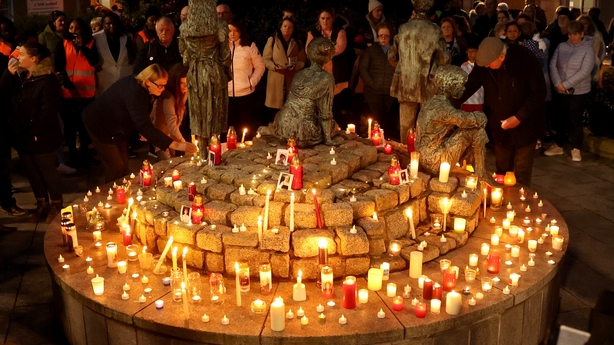It is exactly one month since the explosion which claimed the lives of 10 people in Creeslough in Co Donegal and, in some ways, there is still a sense of unreality in the village.
Diversions remain in place and you cannot drive through the village where the site of the explosion is sealed off for ongoing forensic examination.
There is a constant garda presence at the cordon around the scene, as work continues in the complex investigation into what caused the explosion.
A number of specialist garda units are involved and are being assisted by a global company, DNV, which specialises in the investigation and testing of energy systems.
So far, gardaí have taken over 260 statements and worked on over 500 lines of inquiry.
On a practical level, the only shop in the village is gone and a temporary modular replacement is being constructed near St Michael's Church. The post office reopened in a temporary location and extra buses bring people to access services in other communities like Dunfanaghy.

However, as day-to-day necessities of life go on, on another level, the families of the bereaved, their friends and community, must contend with trying to cope with the devastation of what happened.
Parish Priest, Fr John Joe Duffy said it is "hour-to-hour and day-by-day for everyone affected and sometimes you wonder were we really there that night?"
"It’s hard to get your head around what happened," he said.
Fr Duffy said the shock and numbness is beginning to wear down and the pain of loss and trauma is becoming more acute.
He said the families and community were helped by the outpouring of sympathy and support, but as this week and next week will see the month’s mind masses being marked for those they lost, he appealed to the media to allow them the time and space to grieve in private.

Fr Duffy again encouraged people to avail of the ongoing supports being made available, because, he said, help is needed.
Dr Maura Finnegan, Principal Clinical Psychologist with the HSE, said that people should know that what they are feeling is a normal reaction to a really horrible thing.
At this stage they may feel that their emotions are tapering off and they are feeling a bit more settled.
Many people will get through with the support of their family and friends, she said, but this will not be the case for everyone.
Dr Finnegan said it will a long time before the community feels any sense of normality and, on this journey, they may need professional supports along the way.
She encouraged people to contact the HAE helpline to access that support.
She said they have a range of supports available now, other tailored supports - early intervention trauma supports - will be available in the new year and more capacity will be built into statutory supports to meet the needs of people in the months and years ahead.
The HSE Support Line number is 087 1405138






